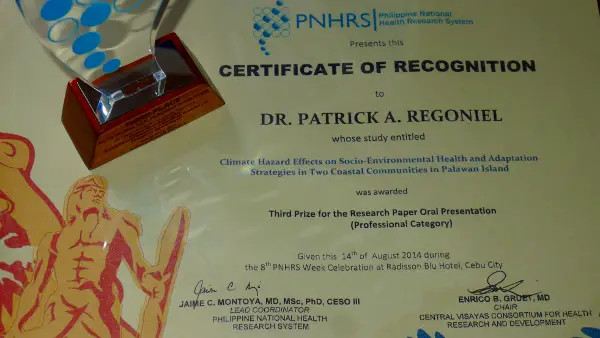How do you write a competitive research paper? Here are 10 points that can guide you towards realizing your goal to win.
Getting awarded for a research paper I hurriedly prepared within a three-day period is something that confirmed my approach in research writing. Last Thursday, August 14, the paper I wrote based on a nine-month project completed in 2013 garnered the third prize in the 8th Philippine National Health Research System (PNHRS) Contest under the professional category.
During the convention, I learned that a total of 31 entries were submitted from all over the country for a double-blind review by experts in the field of health. And only three research papers made it – mine included. More than 500 participants nationwide coming from the 17 regional health research consortia participated in the event.
A senior colleague and once the university’s Vice-President for Academic Affairs was instrumental to my success as she prodded me to join the contest although I had misgivings because the deadline was three days away. Despite my apprehension, I confidently nodded and said okay. I thought I might be able to glean useful data and information from recently concluded research project on the economic analysis of household adaptation options to climate change.
I summoned all I could muster to at least beat the deadline despite the limited time frame. I reviewed relevant literature and organized my thoughts as I write, guided by the theme of the celebration.
I did this kind of writing before mainly for compliance; but this time, I thought I’d aim to win — for a change. I’m giving research tips in this site and I’d like to put them to work. My intention was, if ever I win the contest, I would share pointers in writing it here. And that will make this site a more credible reference for colleagues and students in writing their research papers.
So here are the 10 key points that helped me deliver a winning research paper despite the time constraint.
10 Key Points for a Winning Research Paper
1. Assess your capability and stick to the deadline.
Before writing anything, note the deadline of paper submission. Is it still possible for you to figure out a paper before the deadline ends? You have to assess your capability and resources at hand to deliver a paper within the prescribed period.
My typing speed of at least 60 words per minute helped me write the research paper with ease as my hands can cope up with what’s in my mind. That speeds up my composition as every idea that comes to mind rapidly goes on paper in real-time.
I like blogging and I’ve written hundreds of online articles for the past six years; so putting ideas into writing has not really become much of an issue. This is the reason I encourage colleagues to blog. This will hone their writing skills while at the same time earn something if they join free writing sites that pay their bloggers.
Back to the deadline issue, if the deadline is Monday, then by all means, submit your research paper on or before the deadline. Indeed, during the announcement of the winners, the chairman of the board of judges mentioned that research papers submitted beyond the deadline were no longer accepted. I submitted my research paper in the afternoon of the deadline date.
2. Make your research paper relevant to the theme.
I made sure that the paper I submitted adheres to the theme of the convention. The convention’s theme focused on the role of health research in disaster and emergency health management. Thus, I titled my paper “Climate Hazard Effects on Socio-Environmental Health and Adaptation Strategies in Two Coastal Communities in Palawan Island.” That’s about disaster’s effect on the health of marginalized communities and how two communities adapted to climatic threats. The communities explored “soft” and “hard” adaptation strategies to make their communities more resilient to the negative effects of climate change.
3. Keep to the rules. See the contest guidelines.
I followed the contest guidelines in its entirety. There is a prescribed format for writing the research paper as well as in the slide presentation. I followed the IMRaD format using my favorite word processor. The slides must not exceed 10, so I prepared 10 slides; no more, no less.
4. Do the writing in the morning.
I have fun doing my write-up in the morning. My mind works best from 4:30 to 11:30 am. After lunch, my brain goes into a slumber. There’s something in the food that makes me sleepy.
According to Ben Biggs, increased serotonin in the brain as a result of eating heartily is the culprit. To keep my writing momentum, I will either eat a small meal at lunchtime, or… sleep.
In that three-day writing spree, I took the latter approach, taking a one-hour nap after lunch. I’m alive after that brief trip to dreamland.
Surprisingly, I was able to sustain my writing from the usual drowsy 2 pm writing struggle. Somehow, the adrenalin push caused by the nearing deadline counteracted the effect of serotonin. At 4 o’clock, I regain back my writing momentum.
5. Have a good review of recent and relevant literature.
Many of the published literature on climate effects are in scientific journals that I have no access at the time of writing. Unfazed by this constraint, I resorted to online material that are both relevant and recent, and of course, free.
My references on the weather and disasters were obtained from mostly government-operated sites that I could rely on as these are public service sites. I gathered the most relevant ones and kept my writing concise, summarizing each report as succinctly as I could by applying the 5Ws and 1H technical writing strategy.

6. Adopt the viewpoint of the reader.
I adopted the viewpoint of the one screening the research paper. I have had experience reading and evaluating the work of others so I tried to take the reader’s viewpoint while I read my own paper. This proved to be difficult because I have my biases. But thinking as if I am the judge myself and using the contest’s judgment criteria, I saw critical areas or arguments in my manuscript that need revision.
Asking colleagues would have been better, but the brief period to prepare the research paper would not allow it. I will certainly do this once another opportunity arises.
7. Be particular about your grammar.
In any contest where English is the medium of expression, a non-native English speaker like me has to rely on previous educational training, readings and references. I did good in English during my high school and college days. Further, I developed my writing skills by reading the composition of great writers as well as practicing the trade, mainly, through blogging.
For me, if it sounds right and not really awkward to read, then it’s probably written right. Further, a good word processor can point out obvious grammatical errors. I made good use of it.
8. Use short sentences.
A veteran research writer colleague reminded me once to keep my sentences brief and concise. This simple suggestion helped me all the way in my writing engagements.
Whenever possible, I see to it that each sentence I write contains one idea or a set of ideas that work harmoniously. This writing style simply works.
9. Provide relevant figures and tables.
Remember the adage “A picture is worth a thousand words?” I selected figures, graphs and tables that contribute to the message I want to put across. Just glancing at these complementary sources of information improves the readers’ understanding of the research paper.
Specifically, for the pictures to include in the research paper, show something controversial or intriguing that will spark a discussion. The picture should be socially relevant if the theme is about people.
As for the tables, I adopt three guidelines: 1) limit columns to a maximum of four as much as possible, 2) arrange the title of each column from the most important to the least important information, and 3) provide explanatory notes under the table for better understanding.
10. Direct your mind towards winning.
When I wrote the research paper, I thought of winning the contest. I didn’t try this mindset before. My write ups were not written to compete but just to comply with the minimum requirements for participation. I didn’t enter any contest for lack of a good reason to do so. I just don’t like to compete as a matter of choice.
How did a changed mindset help me write better?
Adopting a winning attitude forced me to bring my talents and creativity to the fore. One of those things that I determined within myself is the idea that I will not settle for anything less as much as possible. I will make my work as perfect as possible if I can afford it. My work should be more than just enough. It should be as excellent as it should, at least in my point of view. So I read and reread the paper many times over.
Of course, the time pressure did not really turn out the best in my research paper as I realized some loopholes when I read it again and when the panel of judges were asking questions. But during the time of writing, the composition was the best I could muster. And it worked, because it passed the initial screening. The research paper made it to the six finalists out of 31 submitted for review.
A proper mindset allows you to harness your talents and creativity. Stanford University psychologist Carol Dweck argues that people with a growth mindset see their qualities as things that can be developed through years of passionate practice and learning. And I believe I just did that.
Finally, connecting ourselves to the Supreme Being and having a noble purpose matters. All these things will not happen without blessings from the One who made it all possible. To Him all glory and honor return. After all, this toil is geared towards the betterment of humanity.
Try these tips and see how you perform. Or if you are a winner yourself, posting your thoughts below will be of great help to research writers.
© 2014 August 17 P. A. Regoniel


Thank you friends and colleagues. 🙂
Congrats Sir Pat!
Congrats sir, more to come! God bless!
Congrats!
Congrats! Keep it up, Sir!